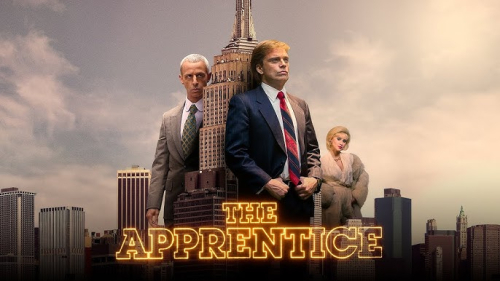Greed, hedonism, power and money: Review of 'The Apprentice'

Review of The Apprentice (2024)
Jon Baldwin, London Metropolitan University
With the US election weeks away comes The Apprentice (dir. Ali Abbasi, 2024) a biopic charting the rise of Donald Trump as a real estate businessman, spending daddy's money, in New York in the 1970s and 1980s. The film's title echoes the television contestant game show of neoliberalism whereby minions fight for the right to be exploited and exploit others in an unjust system under the guise of becoming an apprentice to the chief-entrepreneur. Those whose morals or human dignity get in the way of their competitive graft and stumble to the top are unceremoniously told: "You're fired!"
The UK version has Lord Alan Sugar as boss. In the USA it was Trump, and the show has been credited as being crucial to his comeback from bankruptcy, profile raising, persona practicing, Trumpism rehearsals, and generally vital to his subsequent political career. In the documentary President Hollywood (BBC 2008) an anecdote is told of how the anti-communist and actor Ronald Reagan responded to a question put to him: "How can an actor be a president?" To which Reagan replied, "How can a president not be an actor?" Indeed, the role of president is performative, media literate, and mere puppetry for capitalist economic power.
The Apprentice opens with footage of Richard Nixon's "I am not a crook" speech. Oliver Stone's 'psychohistory' presidential biopic Nixon (1995) probed the depths of Nixon with the notion of a 'beast' of history. This is somewhat like a headless monster that lurches through postwar US history, with the assassinations of John F. Kennedy, Robert F. Kennedy, and Martin Luther King Jr., and the Vietnam War, all of which helped Nixon's rise to power and sealed his fall as well with Watergate. What might be this 'beast'? Stone hints at the military-industrial complex and the forces of money. Stone's Nixon is an analysis of a tormented, flawed figure, produced by the American Dream ideology of individualism and following the ruthless competitive pattern of the will to succeed. Stone's film stands or fails on this incessant probing of Nixon's inner workings.
With The Apprentice and Trump there are no such depths to probe. It is all on the surface: greed, hedonism, power and money. As Roy Cohn explains to Trump in the film, "It's an advantage to not care what people think of you. Fuck what people think of you. There is no right or wrong. There is no morality. There is no truth with a capital t. It's a construct, it's a fiction, its manmade. None of it matters except winning. That's it." Here in a nutshell is neoliberal ideology in plain sight. The relativism adds to the sense that Trump was the first postmodern president. Later we see Trump's mother reading out loud to Trump a magazine puff piece on him which highlights his white teeth. Both find this detail extremely appealing. As postmodern philosopher, Jean Baudrillard once wrote, "Americans may have no identity, but they do have wonderful teeth."
The New York of the film is a cross between the grit and grime of Taxi Driver and the glamour and glitz of the tv show Dallas. Indeed the 80s aesthetic of bouffant hair, gold-plated mirror frames, shoulderpads and pinstripes echo the notion that Trump is a poor man's idea of what a rich man looks like. In this sleazy New York, odious men in shiny suits in smoky backrooms behind dark bars exchange toxic masculinity and power plays. It all feels a little clichéd and worn, but then this was Trump's habitat.
The Apprentice centres on Trump's relationship with closeted gay communist-basher Roy Cohn. In a Faustian pact with the cut-throat lawyer and political fixer, Trump is offered Cohn's support and three golden rules of winning: Attack, attack, attack; admit nothing, deny everything; claim victory, never admit defeat. This mantra will serve Trump, less so others, well down the years. Trump later turns his back on his mentor when Cohn develops AIDS. Add in the marital rape of Ivana, addiction to amphetamines, liposuction and scalp-reduction surgeries, and the film reveals a rotten bed to the US capitalist and political systems. Of course, Trump has threatened to sue for 'malicious defamation' but this is precisely from his well-worn playbook of attack, deny, claim victory.
Hollywood representations of the US president as cynical and corrupt emerged after Watergate. The image got cleaner in the in 1990s with Dave (1993,) The American President (1995), and The West Wing (1999) presenting liberal, likeable, smart, democrats, somewhat mirroring Bill Clinton. The fall and flawed nature of Clinton was echoed in Primary Colours (1998) and Wag the Dog (1998) which brilliantly showed Hollywood producers creating a fake war to turn attention away from what the president had got up to in his bedroom. The election of George W. Bush saw Hollywood produce a 'moron' president archetype who is both dumb and mean. Only now do we have a political villain usurping anything Hollywood scriptwriters in their most vivid and desperate imagination could have conjured.
The film, frankly, is as bleak as its subject matter. Hence it is a great success in capturing the zeitgeist of the cynicism of the Nixon years and rise of corporate greed during Reagan. These are the very times that bred and allowed a later fascism to thrive.

Jon Baldwin
Jon Baldwin is Senior Lecturer in Film and Digital Media at London Metropolitan University. He recently edited a film/tv special edition of the Journal of Class and Culture."
